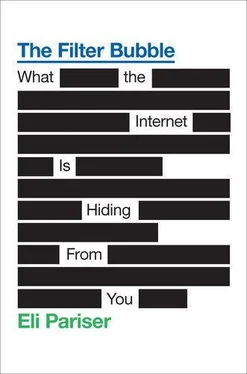145 the cloud “is actually just a handful of companies”:Clive Thompson, interview with author, Brooklyn, NY, Aug. 13, 2010.
145 there was nowhere to go:Peter Svensson, “WikiLeaks Down? Cables Go Offline After Site Switches Servers,” Huffington Post , Dec. 1, 2010, accessed Feb. 9, 2011, www.huffingtonpost.com/2010/12/01/wikileaks-down-cables-go-_n_790589.html.
145 “lose your constitutional protections immediately”:Christopher Ketcham and Travis Kelly, “The More You Use Google, the More Google Knows About You,” AlterNet, Apr. 9, 2010, accessed Dec. 17, 2010, www.alternet.org/investigations/146398/total_information_awareness:_the_more_you_use_google,_the_more_google_knows_about_you_?page=entire.
146 “cops will love this”:“Does Cloud Computing Mean More Risks to Privacy?,” New York Times , Feb. 23, 2009, accessed Feb. 8, 2011, http://bits.blogs.nytimes.com/2009/02/23/does-cloud-computing-mean-more-risks-to-privacy.
146 the three companies quickly complied:Antone Gonsalves, “Yahoo, MSN, AOL Gave Search Data to Bush Administration Lawyers,” Information Week , Jan. 19, 2006, accessed Feb. 9, 2011, www.informationweek.com/news/security/government/showArticle.jhtml?articleID=177102061.
146 predict future real-world events:Ketcham and Kelly, “The More You Use Google.”
146 “an individual must increasingly give information”:Jonathan Zittrain, The Future of the Internet—and How to Stop It (New Haven: Yale University Press, 2008), 201.
147 “an implicit bargain in our behavior”:John Battelle, phone interview with author, Oct. 12, 2010.
147 “redistribution of information power”:Viktor Mayer-Schonberger, Delete: The Virtue of Forgetting in the Digital Age (Princeton: Princeton University Press, 2009), 107.
148 real-world violence:George Gerbner, “TV Is Too Violent Even Without Executions,” USA Today , June 16, 1994, 12A, accessed Feb. 9, 2011 through LexisNexis.
149 “who tells the stories of a culture”: “Fighting ‘Mean World Syndrome,’” GeekMom blog, Wired , Jan. 27, 2011, accessed Feb. 9, 2011, www.wired.com/geekdad/2011/01/fighting-%E2%80%9Cmean-world-syndrome%E2%80%9D/.
149 friendly world syndrome:Dean Eckles, “The ‘Friendly World Syndrome’ Induced by Simple Filtering Rules,” Ready-to-Hand: Dean Eckles on People, Technology, and Inference blog, Nov. 10, 2010, accessed Feb. 9, 2011, www.deaneckles.com/blog/386_the-friendly-world-syndrome-induced-by-simple-filtering-rules/.
149 gravitated toward Like:“What’s the History of the Awesome Button (That Eventually Became the Like Button) on Facebook?” Quora Forum, accessed Dec. 17, 2010, www.quora.com/Facebook-company/Whats-the-history-of-the-Awesome-Button-that-eventually-became-the-Like-button-on-Facebook.
151 “against the cruise line industry”:Hollis Thomases, “Google Drops Anti-Cruise Line Ads from AdWords,” Web Ad.vantage, Feb. 13, 2004, accessed Dec. 17, 2010, www.webadvantage.net/webadblog/google-drops-anti-cruise-line-ads-from-adwords-338.
151–52 identify who was persuadable:“How Rove Targeted the Republican Vote,” Frontline , accessed Feb. 8, 2011, www.pbs.org/wgbh/pages/frontline/shows/architect/rove/metrics.html.
152 “Amazon’s recommendation engine is the direction”:Mark Steitz and Laura Quinn, “An Introduction to Microtargeting in Politics,” accessed Dec. 17, 2010, www.docstoc.com/docs/43575201/An-Introduction-to-Microtargeting-in-Politics.
153 round-the-clock “war room”:“Google’s War Room for the Home Stretch of Campaign 2010,” e.politics, Sept. 24, 2010, accessed Feb. 9, 2011, www.epolitics.com/2010/09/24/googles-war-room-for-the-home-stretch-of-campaign-2010/.
155 “campaign wanted to spend on Facebook”:Vincent R. Harris, “Facebook’s Advertising Fluke,” TechRepublican , Dec. 21, 2010, accessed Feb. 9, 2011, http://techrepublican.com/free-tagging/vincent-harris.
155 have the ads pulled off the air:Monica Scott, “Three TV Stations Pull ‘Demonstrably False’ Ad Attacking Pete Hoekstra,” Grand Rapids Press, May 28, 2010, accessed Dec. 17, 2010, www.mlive.com/politics/index.ssf/2010/05/three_tv_stations_pull_demonst.html.
157 “improve the likelihood that a registered Republican”:Bill Bishop, The Big Sort: Why the Clustering of Like-Minded America Is Tearing Us Apart (New York: Houghton Mifflin, 2008), 195.
157 “likely to be most salient in the politics”:Ronald Inglehart, Modernization and Postmodernization (Princeton: Princeton University Press, 1997), 10.
159 Pabst began to sponsor hipster events:Neal Stewart, “Marketing with a Whisper,” Fast Company, Jan. 11, 2003, accessed Jan. 30, 2011, www.fastcompany.com/fast50_04/winners/stewart.html.
159 “$44 in US currency”:Max Read, “Pabst Blue Ribbon Will Run You $44 a Bottle in China,” Gawker , July 21, 2010, accessed Feb. 9, 2011, http://m.gawker.com/5592399/pabst-blue-ribbon-will-run-you-44-a-bottle-in-china.
160 “I serve as a blank screen”:Barack Obama, The Audacity of Hope: Thoughts on Reclaiming the American Dream (New York: Crown, 2006), 11.
161 “We lose all perspective”:Ted Nordhaus, phone interview with author, Aug. 31, 2010.
162 “the source is basically in thought”:David Bohm, Thought as a System (New York: Routledge, 1994) 2.
163 “participants in a pool of common meaning”:David Bohm, On Dialogue (New York: Routledge, 1996), x–xi.
164 “define and express its interests”:John Dewey, The Public and Its Problems (Athens, OH: Swallow Press, 1927), 146.
Chapter Six: Hello, World!
165 “no intelligence or skill in navigation”:Plato, First Alcibiades , in The Dialogues of Plato, vol. 4, trans. Benjamin Jowett (Oxford, UK: Clarendon Press, 1871), 559.
166 “We are as Gods”:Stewart Brand, Whole Earth Catalog (self-published, 1968), accessed Dec. 16, 2010, http://wholeearth.com/issue/1010/article/195/we.are.as.gods.
167 “make any man (or woman) a god”:Steven Levy, Hackers: Heroes of the Computer Revolution (New York: Penguin, 2001), 451.
167 “having some troubles with my family”:“How Eliza Works,” accessed Dec. 16, 2010, http://chayden.net/eliza/instructions.txt.
168 “way of acting without consequence”:Siva Vaidyanathan, phone interview with author, Aug. 9, 2010.
168 “not a very good program”:Douglas Rushkoff, interview with author, New York, NY, Aug. 25, 2010.
168 “politics tends to be seen by programmers”:Gabriella Coleman, “The Political Agnosticism of Free and Open Source Software and the Inadvertent Politics of Contrast,” Anthropological Quarterly , 77, no. 3 (Summer 2004): 507–19, Academic Search Premier, EBSCOhost .
170 “addictive control as well”:Levy, Hackers, 73.
172 “Howdy” is a better opener than “Hi”:Christian Rudder, “Exactly What to Say in a First Message,” Sept. 14, 2009, accessed Dec. 16, 2010, http://blog.okcupid.com/index.php/online-dating-advice-exactly-what-to-say-in-a-first-message.
Читать дальше











